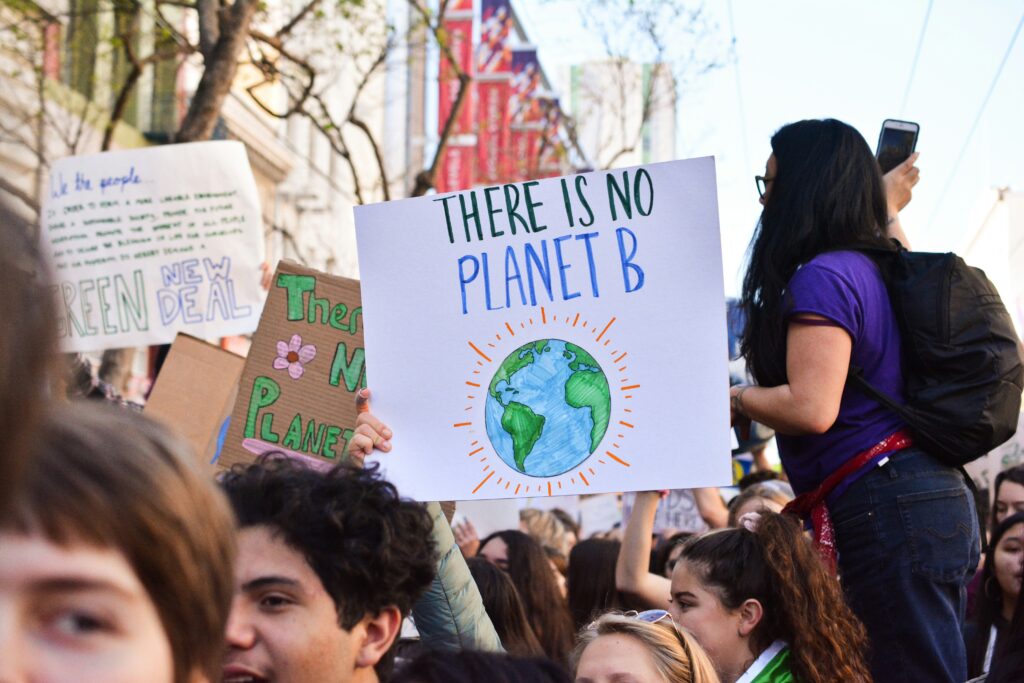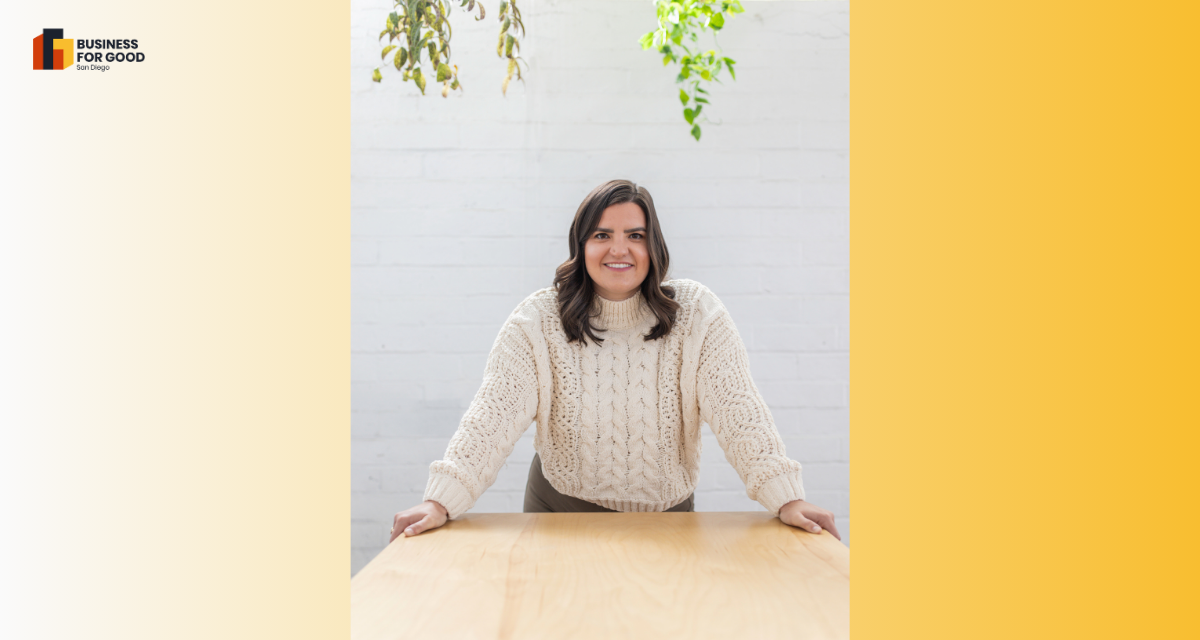Federal climate policy is rolling back. But we are not.

When we talk about climate policy, it’s easy to think of it as something far away—something handled by people in suits, in buildings we don’t walk into, in places we’ve never been.
But federal environmental rollbacks don’t stay in D.C. They show up right here in San Diego. They affect the air we breathe, the bills we pay, and the way we run our businesses.
That’s why our mantra at Business For Good is “think locally, act locally.” Our goal is to provide advocacy education and awareness of policies and business practices that build a more sustainable, equitable San Diego community.
While the news cycle can feel overwhelming, it’s heartening to remember that our 110+ BFG members are paying attention, taking action, and doing what they can to build a better future from the ground up.
In honor of Earth Month, this piece features three local business owners and BFG members who care deeply about climate policy and live with its impact every day.
Their insights are sharp. Their stories are personal. And their actions? Rooted right here in San Diego.
Discover what top federal climate policy rollbacks actually mean as we break down what’s happening. Because when we understand why it matters, we can move forward together as a community, without burning out or tuning out.
From the front lines of California fires
One of the biggest federal climate policy shifts flying under the radar right now? The freeze on federal funding for wildfire prevention.
For longtime Californians, wildfires aren’t just updates that slow your scroll—they’re lived experiences.
Erica Castillo, a BFG member and strategic communications consultant, has been evacuated from her California home more than once. “It’s devastating and traumatic,” she says. “These disasters don’t just destroy property. They disrupt entire communities.”
That’s why bills like the Fix Our Forests Act are so concerning. The Act is framed as wildfire prevention, but it cuts corners that matter—like skipping environmental reviews for projects as large as 10,000 acres, with no space for public input. It shifts power away from local communities and hands it to agencies and industries, fast-tracking decisions that deserve more scrutiny.
For fire-prone regions like San Diego, the cost of getting this wrong is deeply personal. “These policies don’t protect us,” Erica says. “They just make it harder for communities like mine to prepare for what’s coming.”
When student loan debt undermines sustainability
High levels of student debt can delay or prevent business creation, home ownership, and other long-term investments that strengthen local economies, according to the Federal Reserve.
It may not carry a climate label, but reversing student loan relief directly affects our capacity to build a more sustainable future.
For instance, a recent executive order has narrowed eligibility for the Public Service Loan Forgiveness program, excluding workers from certain nonprofit organizations deemed to engage in “improper” activities, such as violating federal immigration laws.
When business owners and employees are buried in financial instability, long-term sustainability becomes harder to prioritize. Fewer people have the capacity to take risks, support green innovation, or even absorb rising utility costs.
For small business owners like Sam Mazzeo, a BFG board member and co-founder of a boutique law firm, the impact is both personal and professional.
“If income-based repayment goes away, my monthly payment jumps from a few hundred dollars to almost $2,000,” he says. “That changes how I pay my staff, how I invest in my business, and how I participate in the local economy.”
Making climate more than a concept
BFG member Erika Rodriguez has been thinking a lot about what businesses actually stand for—especially when no one’s watching.
As the founder of Nadi Marketing, she has seen major corporations quietly walk back their commitments to diversity, equity, and inclusion (DEI), as well as sustainability.
That kind of shift doesn’t happen on its own. In early 2025, a federal executive order (EO 14173) called for the removal of DEI programs across government agencies—and signaled to federal contractors that continuing those efforts could come at a cost. It sent a clear message: pull back, or risk losing funding.
But this time, people noticed.
“When large brands pulled back, customers pushed back—with their wallets,” Erika says. For her, that kind of accountability matters. It’s not about perfection. It’s about consistency. And it’s a reminder that small, local businesses often lead the way—not with slogans, but with action.
Years ago, Erika was caught in a Category 4 cyclone while traveling in Fiji. It was real, terrifying, and unforgettable.
That moment inspired Erika to become a dedicated advocate for climate change solutions. Today, that clarity shows up in how she runs her business, how she partners with clients, and how she pushes for change.
She’s letting her values shape the vision, one choice at a time.
Real-world sustainability behind the scenes
Even with climate policies shifting at the federal level, San Diego business owners aren’t standing still. They’re adjusting how they operate—sometimes in visible ways, more often in quiet and thoughtful ones.
For many BFG business-owner members, sustainability isn’t a separate initiative. It shows up in their daily choices, client work, and the values that guide everything they do.
For example, Erika’s work centers clients committed to low-waste, reuse-first models—and she’s just as intentional internally. “We bring our own mugs, we recharge batteries, we print only when we have to,” she says. “It’s simple, but it keeps us accountable.”
At Sam’s law firm, the team makes intentional choices around carbon offsets, sustainable commuting, and recommending recycled products to clients. “We try to be mindful across the board,” he says. “Even small stuff like which vendors we support or which swag we give out—that’s part of it.”
Erica brings a civic lens to everything from how she runs meetings to how she guides her clients. “I always tell people—read the city’s Climate Action Plan,” she says. “That’s how we connect daily business decisions to bigger goals.”
Turn intention into everyday action
If you’re wondering how to be more sustainable without overhauling your entire business—this part’s for you. Our BFG members have a few solid suggestions for making small, incremental changes that deliver a big impact.
- Take inventory of all your business partnerships. Erika recommends starting with the everyday relationships you already have. “Start by looking at the vendors and service providers you already use—like your bank, accountant, or legal team,” she says. “Are they aligned with your values? Are they supporting sustainability in real, measurable ways?”
- Get the big picture of your operations. For Sam, it’s about staying curious and paying attention to the ripple effect of your choices. He points business owners to tools like the B Lab Impact Assessment to get a sense of where they stand. “That assessment opened my eyes for my business,” he says. “It’s free, and it’s a really honest look at what you’re doing—and what you could do better.”
- Review San Diego’s Climate Action Plan. Erica encourages business owners to get familiar with San Diego’s Climate Action Plan—not just the headlines, but the actual document. “It helps you see where your business fits into the city’s bigger climate goals,” she says. “And it makes advocacy feel less abstract.”
The point isn’t to get it perfect. It’s to make progress, one step at a time.
Hope is a practice for change
Hope comes in all sizes. Sometimes, hope is as simple as someone doing the next right thing—quietly and consistently.
Educating our members on becoming an advocate for sustainable, equitable business policies and practices is one of our core values at BFG.
As a BFG member, Erika pays attention to the choices that seem small on the surface—who we bank with, who we partner with, how we show up when no one’s looking.
Sam’s thinking is bigger-picture, imagining new ways of doing business that aren’t so tied to broken systems.
And Erica sees it all around her—in the San Diegans pushing for progress with creativity and care. None of them are waiting for someone else to fix it. They’re already doing the work, and that’s what keeps them going.
Change rarely comes from one place or one policy. Instead, it grows from how we show up at home, the voting booth, our businesses, and in our communities.
